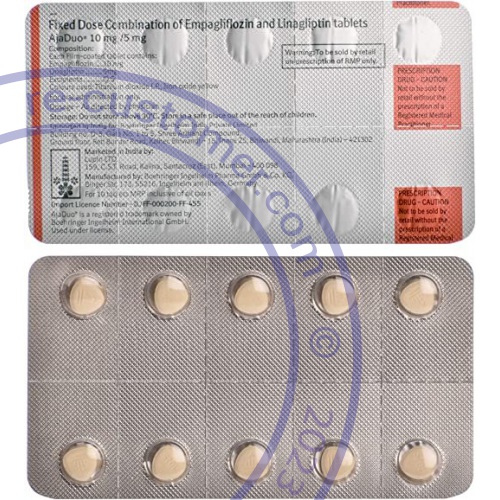- Trusted Tablets
- Diabetes
- Glyxambi

Brand(s): AjaDuo
Manufacturer: Lupin
Disease(s): Diabaetes
| Package | Price | Per tablet | Savings | Order |
|---|---|---|---|---|
| 10mg + 5mg × 90 tablets | $ 494.95 | $ 5.50 | $ 44.90 | Add to cart |
| Free AirMail shipping | ||||
| 10mg + 5mg × 60 tablets | $ 344.95 | $ 5.75 | $ 14.95 | Add to cart |
| Free AirMail shipping | ||||
| 10mg + 5mg × 30 tablets | $ 179.95 | $ 6.00 | Add to cart | |
| Free AirMail shipping | ||||
Empagliflozin and linagliptin tablets
What is empagliflozin and linagliptin?
Empagliflozin and linagliptin is a combination medicine used together with diet and exercise to improve blood sugar control in adults with type 2 diabetes mellitus.
Empagliflozin and linagliptin is also used to lower the risk of death from heart attack, stroke, or heart failure in adults with type 2 diabetes who also have heart disease.
Empagliflozin and linagliptin is not for treating type 1 diabetes.
Empagliflozin and linagliptin may also be used for purposes not listed in this medication guide.
Warnings
Stop taking this medicine and call your doctor at once if you have signs of a serious side effect, such as severe stomach pain (may spread to your back), vomiting, tiredness, or trouble breathing.
Tell your doctor if you are sick with vomiting or diarrhea, or if you eat or drink less than usual.
This medicine can cause serious infections around the penis or vagina. Get medical help right away if you have burning, itching, odor, discharge, pain, tenderness, redness or swelling of the genital or rectal area, fever, or if you don't feel well.
Before taking this medicine
You should not use empagliflozin and linagliptin if you are allergic to empagliflozin or linagliptin, or if you have:
- severe kidney disease (or if you are on dialysis);
- a history of severe allergic or skin reaction after taking empagliflozin or linagliptin; or
- diabetic ketoacidosis (call your doctor for treatment).
Tell your doctor if you have ever had:
- liver or kidney disease;
- a bladder infection or urination problems;
- a pancreas disorder;
- heart failure;
- gallstones;
- a genital infection (penis or vagina);
- alcoholism, or if you currently drink large amounts of alcohol;
- if you are on a low salt diet; or
- if you are 65 or older.
Follow your doctor's instructions about using this medicine if you are pregnant or you become pregnant. Controlling diabetes is very important during pregnancy.
You should not use empagliflozin and linagliptin during the second or third trimester of pregnancy.
Do not breastfeed.
How should I take empagliflozin and linagliptin?
Follow all directions on your prescription label and read all medication guides or instruction sheets. Your doctor may occasionally change your dose. Use the medicine exactly as directed.
Empagliflozin and linagliptin is usually taken in the morning, with or without food.
Your blood sugar will need to be checked often, and you may also need to test the level of ketones in your urine. Empagliflozin can cause life-threatening ketoacidosis (too much acid in the blood). Even if your blood sugar is normal, contact your doctor if a urine test shows that you have high ketones in the urine.
Blood sugar can be affected by stress, illness, surgery, exercise, alcohol use, or skipping meals.
Low blood sugar (hypoglycemia) can make you feel very hungry, dizzy, irritable, or shaky. To quickly treat hypoglycemia, eat or drink hard candy, crackers, raisins, fruit juice, or non-diet soda. Your doctor may prescribe glucagon injection in case of severe hypoglycemia.
You may get dehydrated during prolonged illness. Call your doctor if you are sick with vomiting or diarrhea, or if you eat or drink less than usual.
This medicine can affect the results of certain lab tests for glucose (sugar) in the urine. Tell any doctor who treats you that you are using empagliflozin and linagliptin.
Your treatment may also include diet, exercise, weight control, and special medical care.
Store at room temperature away from moisture and heat.
What should I avoid while taking empagliflozin and linagliptin?
Avoid drinking alcohol.
Avoid getting up too fast from a sitting or lying position, or you may feel dizzy.
Empagliflozin and linagliptin side effects
Get emergency medical help if you have signs of an allergic reaction: hives, itching, flaking or peeling skin; trouble swallowing, difficult breathing; swelling of your face, lips, tongue, or throat.
Seek medical attention right away if you have signs of a serious genital infection (penis or vagina): burning, itching, odor, discharge, pain, tenderness, redness or swelling of the genital or rectal area, fever, not feeling well. These symptoms may get worse quickly.
Stop taking empagliflozin and linagliptin and call your doctor at once if you have:
- a light-headed feeling, like you might pass out;
- severe or ongoing pain in your joints;
- serious skin reaction--itching, blisters, breakdown of the outer layer of skin;
- ketoacidosis (too much acid in the blood)--nausea, vomiting, stomach pain, confusion, unusual drowsiness, or trouble breathing;
- pancreatitis--severe pain in your upper stomach spreading to your back, nausea and vomiting;
- dehydration--dizziness, confusion, feeling very thirsty, less urination;
- signs of a bladder infection--pain or burning when you urinate, blood in your urine, pain in pelvis or back; or
- symptoms of heart failure--shortness of breath (even while lying down), swelling in your legs or feet, rapid weight gain.
Common side effects may include:
- a bladder infection; or
- cold symptoms such as runny or stuffy nose, sneezing, sore throat.
This is not a complete list of side effects and others may occur. Call your doctor for medical advice about side effects.
What other drugs will affect empagliflozin and linagliptin?
Other drugs may increase or decrease the effects of empagliflozin and linagliptin on lowering your blood sugar. Tell your doctor about all your current medicines and any you start or stop using, especially:
- insulin, or other oral diabetes medicine;
- rifampin (to treat tuberculosis); or
- a diuretic or "water pill."
This list is not complete. Other drugs may affect empagliflozin and linagliptin, including prescription and over-the-counter medicines, vitamins, and herbal products. Not all possible interactions are listed in this medication guide.

Can i help you?



